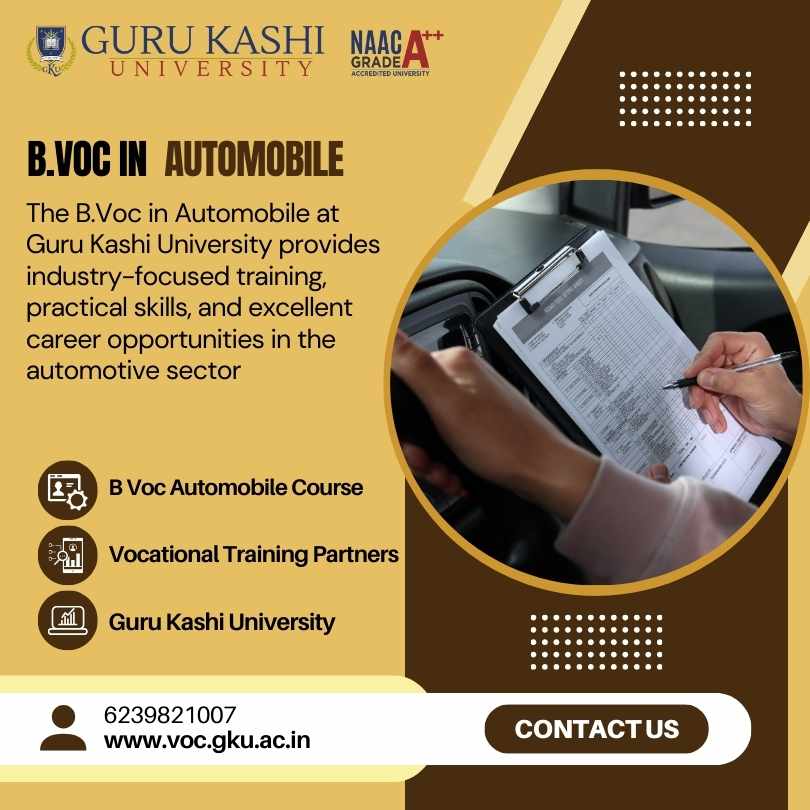The automotive industry stands at the crossroads of rapid technological advancements, sustainability, and innovation. To thrive in this competitive field, aspiring professionals require more than just academic knowledge—they need practical experience that equips them to meet real-world challenges. A program like the B.Voc in Automobile at Guru Kashi University bridges the gap between theory and practice, with industry exposure forming the backbone of its curriculum. This hands-on approach ensures students graduate as skilled professionals ready to make an impact in the dynamic automotive sector.
Understanding Industry Exposure in a B.Voc in Automobile
Industry exposure encompasses real-world experiences, including internships, live projects, industrial visits, and training programs, integrated into the academic framework. For students pursuing the B.Voc in Automobile course, it provides opportunities to work directly with modern automotive systems, interact with industry professionals, and understand the operational dynamics of the sector.
This exposure is particularly vital in the automotive industry, where technological innovations such as electric vehicles (EVs), autonomous driving, and advanced diagnostics demand a workforce equipped with both practical skills and technical expertise.
The Key Benefits of Industry Exposure
1. Bridging the Gap Between Theory and Practice
A B.Voc in Automobile combines classroom learning with hands-on training to give students a comprehensive understanding of automotive systems. Industry exposure allows students to:
- Apply theoretical knowledge in practical scenarios, such as diagnosing engine faults or assembling vehicle components.
- Operate advanced tools and machinery used in automotive manufacturing and maintenance.
- Develop expertise in emerging technologies like EV systems, telematics, and AI-driven diagnostics.
At Guru Kashi University, students benefit from modern facilities and state-of-the-art labs, ensuring they gain firsthand experience with cutting-edge automotive technologies.
2. Real-World Problem Solving
Industry exposure fosters critical thinking and problem-solving skills by immersing students in real-world challenges. During internships or live projects, students might:
- Troubleshoot mechanical and electronic systems in vehicles.
- Optimize manufacturing processes to reduce costs and improve efficiency.
- Address customer complaints and provide solutions in a service environment.
These experiences not only enhance technical skills but also build confidence and adaptability, qualities essential for success in the automotive sector.
3. Collaboration with Vocational Training Partners
Vocational programs like the B.Voc in Automobile course often collaborate with vocational training partners to ensure students receive practical, industry-relevant training. These partnerships provide:
- Internships and Apprenticeships: Students gain on-the-job experience in reputable automotive companies, learning from seasoned professionals.
- Workplace Insights: Exposure to the organizational structure, safety protocols, and operational workflows of the industry.
- Networking Opportunities: Building connections with mentors, industry leaders, and potential employers.
Such collaborations ensure students develop a deep understanding of industry requirements and are better prepared to meet them upon graduation.
4. Exposure to Emerging Automotive Technologies
The automotive industry is rapidly evolving, with advancements in sustainable mobility, automation, and connectivity. Industry exposure introduces students to these innovations through:
- Workshops and Seminars: Led by industry experts, these sessions provide insights into topics like electric powertrains, smart vehicles, and green manufacturing processes.
- Hands-On Training: Working with modern diagnostic tools, simulation software, and 3D modeling systems to gain proficiency in advanced technologies.
- Live Projects: Opportunities to contribute to the development and testing of new automotive solutions.
This exposure ensures students remain up-to-date with technological trends, making them highly competitive in the job market.
5. Development of Professional Skills
In addition to technical expertise, industry exposure helps students cultivate essential soft skills, including:
- Teamwork and Collaboration: Working effectively with colleagues in a fast-paced, team-oriented environment.
- Communication Skills: Engaging professionally with clients, supervisors, and team members.
- Time Management: Balancing multiple responsibilities and meeting deadlines.
- Leadership Qualities: Taking initiative and managing projects independently.
These skills enhance employability and prepare students to excel in diverse roles within the automotive sector.
6. Career Preparedness and Employability
Industry exposure plays a crucial role in preparing students for the workforce. By working on live projects and internships, students develop a professional mindset and gain practical insights into industry expectations. Benefits include:
- Higher Employability: Practical experience makes graduates more attractive to employers, as they require minimal additional training.
- Diverse Career Paths: Students can pursue roles such as automotive technician, design engineer, quality analyst, or service manager.
- Global Opportunities: With training in emerging technologies, graduates can explore opportunities in international markets.
At Guru Kashi University, the B.Voc in Automobile course is complemented by robust placement support, helping students secure positions in leading automotive companies.
Why Choose Guru Kashi University for a B.Voc in Automobile?
Guru Kashi University stands out for its commitment to delivering high-quality vocational education tailored to industry needs. Key highlights of the B.Voc in Automobile program include:
- Modern Infrastructure: Advanced labs and workshops equipped with the latest tools and technologies.
- Industry-Driven Curriculum: Courses designed in collaboration with industry experts to ensure relevance and practicality.
- Experienced Faculty: Professionals with extensive industry backgrounds who mentor and guide students.
- Strong Industry Partnerships: Collaborations with leading vocational training partners to provide real-world learning opportunities.
These features make Guru Kashi University a top choice for students seeking a future-ready education in automotive technology.
Read Also: Is a B.Voc in Hotel Management and Catering the Gateway to High-Paying Jobs?
Conclusion
Industry exposure is a vital component of the B.Voc in Automobile program, equipping students with the skills, knowledge, and confidence needed to excel in the automotive industry. By integrating hands-on training, internships, and cutting-edge technology into its curriculum, Guru Kashi University ensures students graduate as competent professionals ready to tackle the challenges of a dynamic field.
For students passionate about vehicles, technology, and innovation, a B.Voc in Automobile with extensive industry exposure offers a pathway to a rewarding and successful career. It not only builds technical expertise but also instills the professional attributes required to thrive in the ever-evolving automotive sector.




